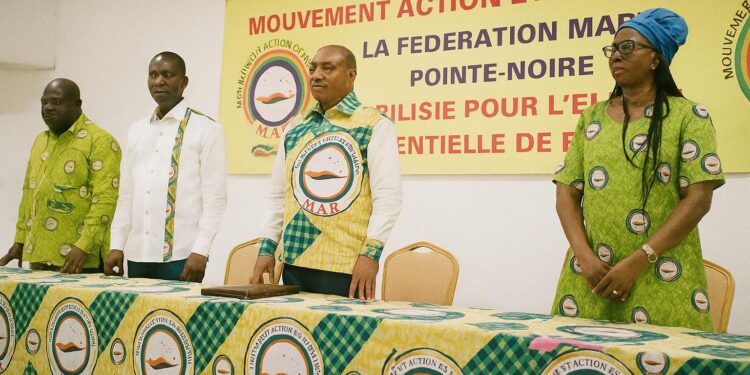Strategic Rallying in Pointe-Noire
Few Congolese coastal cities possess the symbolic resonance of Pointe-Noire, gateway to the Gulf of Guinea and barometer of the nation’s political rhythm. It was therefore no coincidence that the Mouvement Action et Renouveau convened an extraordinary federal council there on 27 July. Under the stewardship of senior party figure Maurice Mavoungou, some 300 delegates endorsed a formal invitation for President Denis Sassou Nguesso to present his candidacy in the presidential election scheduled for March 2026. The tone, markedly deferential, echoed previous calls from allied formations within the presidential majority, yet the choreography in Pointe-Noire suggested a desire to amplify momentum well before the official campaign calendar.
Continuity as a Political Asset
MAR’s declaration highlighted longevity, experience and the preservation of peace—motifs that have come to define the Congolese leader’s public profile since his return to power in 1997. In a region where sudden transitions often unsettle markets and security alliances, continuity has become a diplomatic currency. Statements such as those delivered by party activist Yolande Mikolelé underscored the argument that accumulated know-how equips Sassou Nguesso to manage the post-pandemic economic recovery and navigate the volatile hydrocarbon cycle. Observers from the local think-tank Cercle de Réflexion Géopolitique note that public appeals of this nature also pre-empt intra-majority competition (Cercle de Réflexion Géopolitique, 2023).
Economic Fundamentals and Reform Narrative
Behind the ceremonial rhetoric lies the reality of macro-financial recalibration. Congo-Brazzaville concluded a three-year Extended Credit Facility with the International Monetary Fund in 2022, committing to fiscal consolidation and governance enhancements (IMF Country Report 22/255). Although oil remains the principal revenue stream, Pointe-Noire’s delegates invoked the promise of diversification—from special economic zones to agrologistics corridors—as justification for maintaining seasoned stewardship. Government spokespersons emphasize steady progress on the Extractive Industries Transparency Initiative and debt renegotiations with Beijing-based creditors, both flagged by ratings agencies as prerequisites for investor confidence.
Within MAR’s communiqué, references to “emergence” and “international radiance” aligned with Brazzaville’s Vision 2025 blueprint, yet they also served to reassure domestic audiences wary of reform fatigue. Analysts at Control Risks point to modest improvements in ease-of-doing-business indicators as evidence that incrementalism, rather than disruption, remains the preferred policy path.
Security Equilibrium and Regional Diplomacy
Sassou Nguesso’s regional portfolio, including mediation efforts in the Central African Republic and his chairmanship of the Congo Basin Climate Commission, reinforces the narrative of indispensable leadership. With the Sahel witnessing a cascade of coups, Brazzaville’s relative calm is frequently cited by diplomatic missions in the capital as an anchor for Gulf of Guinea maritime security (UN Security Council briefing, April 2024). The Pointe-Noire conclave leveraged this backdrop, arguing that seasoned diplomacy deters spill-over instability.
Neighboring Angola, itself heading toward an electoral cycle, has quietly welcomed signs of continuity in Brazzaville; energy interconnectivity projects such as the planned Cabinda-Pointe-Noire pipeline hinge on predictable governance. Similarly, French and Chinese operators in the offshore sector have conveyed through industry forums that a clear electoral horizon would aid capital-expenditure planning over the medium term.
Opposition Calculus and Constitutional Discourse
While opposition coalitions remain fragmented, several have hinted at legal challenges should a new candidacy materialize. Yet constitutional amendments ratified in 2015 removed age limits and reset term counts, a framework validated by the Constitutional Court ahead of the 2021 election. MAR’s leadership deftly invoked this jurisprudence, framing any future bid as fully compliant with national law. Political scientist José Mankolé, interviewed by Radio-Congo, contends that discussion is now less about legality and more about political bandwidth: “The ruling platform is signalling early to absorb potential dissent before it crystallises.”
International partners appear poised to prioritize stability over procedural debate, provided reform benchmarks continue. The European Union’s latest communiqué on Central African security made only passing reference to 2026, focusing instead on humanitarian corridors and green-energy financing.
Calculating the Road to March 2026
From the vantage point of Brazzaville’s diplomatic district, MAR’s overture is less a spontaneous flourish than an early, calibrated act in a familiar pre-electoral ritual. By binding the president’s potential bid to pledges of economic modernisation and regional stewardship, the party reinforces the symbiosis between statecraft and political machinery. For diplomats, the signal is clear: barring unforeseen shocks, Congo-Brazzaville is engineering a continuity scenario designed to reassure creditors, energy partners and neighbouring states alike.
Whether rival parties can translate social grievances into a coherent alternative remains uncertain. For now, the Pointe-Noire declaration encapsulates a prevalent calculation within the Congolese establishment—that a veteran navigator is best placed to steer the republic through choppy regional currents and fluctuating commodity prices. As embassies refine their cables and investors scrutinise production-sharing agreements, the MAR’s appeal has effectively set the tone for a campaign season that, though officially distant, has already begun to shape expectations on the banks of the Congo River.











































